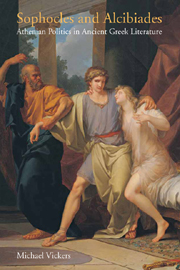Book contents
- Frontmatter
- Contents
- Preface
- 1 The mythologizing of history
- 2 Antigone, Pericles and Alcibiades
- 3 Oedipus Tyrannus, Alcibiades, Cleon and Aspasia
- 4 Ajax, Alcibiades and Andocides
- 5 Philoctetes, Alcibiades, Andocides and Pericles
- 6 Alcibiades in exile: Euripides' Cyclops
- 7 Oedipus at Colonus, Alcibiades and Critias
- 8 Critias and Alcibiades: Euripides' Bacchae
- 9 Alcibiades and Melos: Thucydides 5.84–116
- 10 Thucydides on tyrannicides: not a “digression”
- 11 Alcibiades and Persia (and more Thucydidean “digressions”)
- 12 Alcibiades and Critias in the Gorgias: Plato's “fine satire”
- Epilogue
- Bibliography
- Index locorum
- Index
3 - Oedipus Tyrannus, Alcibiades, Cleon and Aspasia
- Frontmatter
- Contents
- Preface
- 1 The mythologizing of history
- 2 Antigone, Pericles and Alcibiades
- 3 Oedipus Tyrannus, Alcibiades, Cleon and Aspasia
- 4 Ajax, Alcibiades and Andocides
- 5 Philoctetes, Alcibiades, Andocides and Pericles
- 6 Alcibiades in exile: Euripides' Cyclops
- 7 Oedipus at Colonus, Alcibiades and Critias
- 8 Critias and Alcibiades: Euripides' Bacchae
- 9 Alcibiades and Melos: Thucydides 5.84–116
- 10 Thucydides on tyrannicides: not a “digression”
- 11 Alcibiades and Persia (and more Thucydidean “digressions”)
- 12 Alcibiades and Critias in the Gorgias: Plato's “fine satire”
- Epilogue
- Bibliography
- Index locorum
- Index
Summary
The basic purpose of this chapter is to revive the idea first expressed in modern times by the eighteenth-century English classical scholar Samuel Musgrave, that we should perhaps see the historical figure of Alcibiades underlying Oedipus in Sophocles' Oedipus Tyrannus. Musgrave (who, according to the Oxford Dictionary of National Biography, “had few superiors” as a student of Greek) was writing in the 1770s, at a time when classical scholarship had not yet become Altertumswissenschaft. If, however, we take Dodds' dictum that “what is not mentioned in the play does not exist” at face value, we could easily observe that Alcibiades is not mentioned by name in Oedipus Tyrannus and stop at this point. There is nevertheless considerable merit in Musgrave's insight as we shall see, and although he did not spell out the reasons for his belief, a case can be made for Alcibiades underlying Oedipus in both Oedipus Tyrannus and Oedipus at Colonus.
The most famous attribute of Oedipus is, in Tom Lehrer's words, that he “loved his mother”: perhaps overmuch, by most standards ancient or modern. Now while “motherlover”, or a synonym, might be a common enough epithet in some circles, the actual phenomenon of sexual relations between a mother and a son is unusual. But without – yet at least – fully identifying Alcibiades with Oedipus it is useful to note that according to his contemporary Antisthenes it was said that Alcibiades was so debauched that “he lay with his mother, his sister and his daughter” (Antisth. 29a Caizzi ap. Ath. 5.220a).
- Type
- Chapter
- Information
- Sophocles and AlcibiadesAthenian Politics in Ancient Greek Literature, pp. 34 - 46Publisher: Acumen PublishingPrint publication year: 2008



